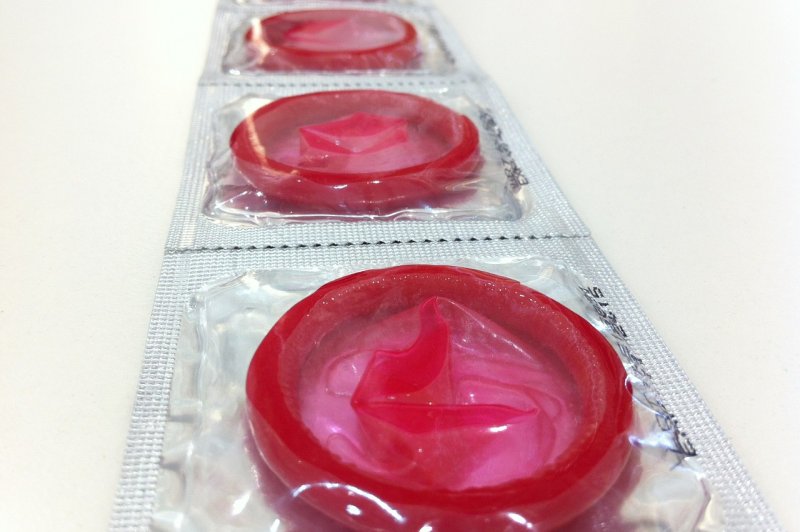Scientists have developed a self-lubricating condom to increase the users' eperience by reducing friction and instead creating a slippery sensation compared with the tradition latex ones, pictured. Photo by kerryank/Pixabay
Oct. 17 (UPI) -- Scientists have developed a self-lubricating condom, which they say could improve user experience by reducing friction and providing longer-lasting lubrication.
The new condom becomes slippery in the presence of bodily fluid, or other liquids, as compared with current latex ones that come pre-lubricated, are relatively rough and can lead to breakage and discomfort, according to findings published Wednesday by Boston University researchers in the journal Royal Society Open Science.
Commercial lubricants, including those applied by manufacturers to condoms, often wear off during sex and may not be an appealing option to some.
"The survey results suggest that an inherently slippery condom could be adopted and could increase condom usage among populations that do not consistently use condoms," the authors wrote. "Taken in conjunction with the results of the condom preference survey ... an HEA/BP/PVP-coated condom shows potential to be an effective strategy for increasing condom usage among populations with a high incidence of STI transmission and unplanned pregnancy."
The researchers developed and optimized a surface treatment technique that involves the coating of natural rubber latex with a thin layer of hydrophilic polymers that, upon contact with water, become slippery to the touch.
Researchers compared the new material with regular latex, as well as latex covered with a water-based lubricant from a bottle.
In friction tests, they found the new material dunked in water was 53 percent more slippery than conventional latex and approximately equal to that afforded by personal lubricant.
They found the self-lubricating material remained consistently slippery over 1,000 cycles, or 16 minutes, of repeated movement against a skin-like surface made of polyurethane. The latex coated in lubricant showed a "decrease in lubriciousness."
In a satisfaction survey, 33 participants, 13 of whom were male, examined the feel of three types of material before and after they had been dunked in water.
Among the participants, 91 percent said they would consider using the new coated condoms.
Of participants that never use condoms, 57 percent agreed they would consider using an HEA/BP/PVP-coated condom regularly.
Also, 73 percent expressed a preference for a condom containing the coating.
The condom has yet to be tested during intercourse because the material has yet to be approved by the U.S. Food and Drug Administration.
Research and development of the new condom was funded by the Bill & Melinda Gates Foundation, which has sought ideas for new technologies that would increase condom usage around the world.
HydroGlyde Coatings, a BU spin-off that will help bring the coated condoms to consumers, has already raised $1.4 million in funding from the National Institute of Health Small Business Innovation Research program, the Massachusetts Tech Transfer Center and the Massachusetts Life Sciences Center.
The researchers have already filed a patent for the idea, and hope their self-lubricating condoms will be on the market within the next two years.
The last significant advancement in condom technology was more than 50 years ago with lubribants, which are now in 99 percent of condoms.
"There really hasn't been an advance since then," Dr. Mark Grinstaff, a bioengineering professor at Boston University, said in a press release. "Glow-in-the dark condoms and flavored condoms are clever gimmicks that don't help performance. I think we can do better."















